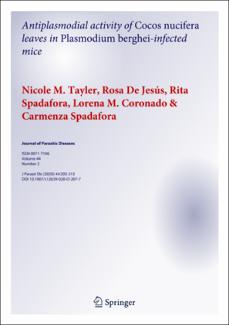Mostrar el registro sencillo del ítem
Antiplasmodial activity of Cocos nucifera leaves in Plasmodium berghei-infected mice
| dc.contributor.author | Tayler, Nicole M. | |
| dc.contributor.author | De Jesús, Rosa | |
| dc.contributor.author | Spadafora, Rita | |
| dc.contributor.author | Coronado, Lorena M. | |
| dc.contributor.author | Spadafora, Carmenza | |
| dc.date.accessioned | 2020-06-17T04:27:19Z | |
| dc.date.available | 2020-06-17T04:27:19Z | |
| dc.date.issued | 2020-03-09 | |
| dc.identifier.issn | ISSN 0971-7196 | |
| dc.identifier.other | doi.org/10.1007/s12639-020-01207-7 | |
| dc.identifier.uri | http://repositorio-indicasat.org.pa/handle/123456789/85 | |
| dc.description | Plasmodium falciparum (P. falciparum) malaria presents serious public health problems worldwide. The parasites resistance to antimalarial drugs has proven to be a significant hurdle in the search for effective treatments against the disease. For this reason, the study of natural products to find new antimalarials remains a crucial step in the fight against malaria. In this study, we aimed to study the in vivo performance of the decoction of C. nucifera leaves in P. berghei-infected mice. We analyzed the effectiveness of different routes of administration and the acute toxicity of the extract. Additionally, we determined the suppressive, curative and prophylactic activity of the extract. The results showed that the decoction of leaves of C. nucifera is most effective when administered intramuscularly to mice in comparison to intraperitoneal, subcutaneous and intragastric methods. We also found that organ signs of acute toxicity appear at 2000 mg/kg/day as evidenced by necropsy examination. Additionally, we found that the prophylactic effect of the extract is of 48% inhibition, however, there is no curative effect. Finally, in a 4-day suppressive assay, we found that the extract can inhibit the growth of the parasite by up to 54% at sub-toxic doses when administered intramuscularly | en_US |
| dc.description.abstract | Plasmodium falciparum (P. falciparum) malaria presents serious public health problems worldwide. The parasites resistance to antimalarial drugs has proven to be a significant hurdle in the search for effective treatments against the disease. For this reason, the study of natural products to find new antimalarials remains a crucial step in the fight against malaria. In this study, we aimed to study the in vivo performance of the decoction of C. nucifera leaves in P. berghei-infected mice. We analyzed the effectiveness of different routes of administration and the acute toxicity of the extract. Additionally, we determined the suppressive, curative and prophylactic activity of the extract. The results showed that the decoction of leaves of C. nucifera is most effective when administered intramuscularly to mice in comparison to intraperitoneal, subcutaneous and intragastric methods. We also found that organ signs of acute toxicity appear at 2000 mg/kg/day as evidenced by necropsy examination. Additionally, we found that the prophylactic effect of the extract is of 48% inhibition, however, there is no curative effect. Finally, in a 4-day suppressive assay, we found that the extract can inhibit the growth of the parasite by up to 54% at sub-toxic doses when administered intramuscularly | en_US |
| dc.format | application/pdf | |
| dc.language.iso | eng | en_US |
| dc.rights | Info:eu-repo/semantics/openAccess | |
| dc.rights | https://creativecommons.org/licenses/by/4.0/ | |
| dc.subject | Plasmodium falciparum | en_US |
| dc.subject | Cocos nucifera Aqueous extract | en_US |
| dc.subject | Antiplasmodial Plasmodium berghei | en_US |
| dc.title | Antiplasmodial activity of Cocos nucifera leaves in Plasmodium berghei-infected mice | en_US |
| dc.type | info:eu-repo/semantics/article | en_US |
| dc.type | Info:eu-repo/semantics/publishedversion |

